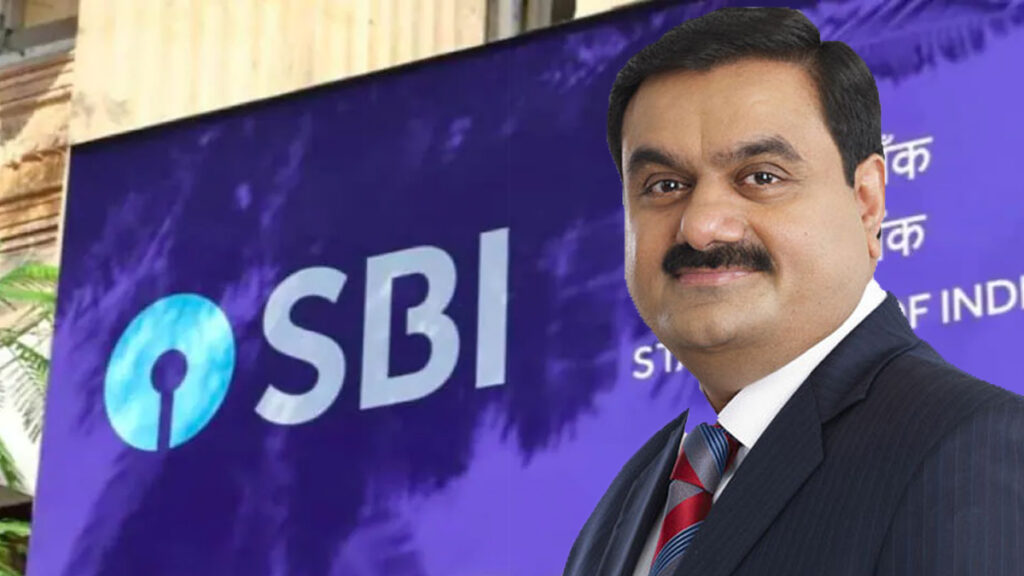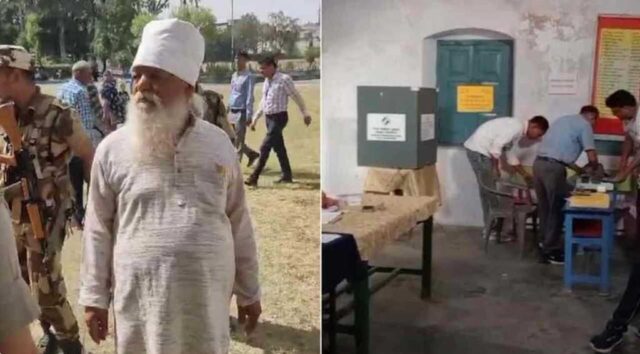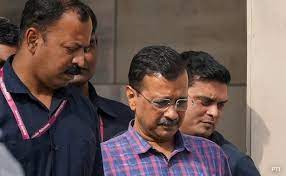About Rs 27,000 crore loan disbursed to Adani group companies: SBI

The country’s largest bank, State Bank of India (SBI) on Friday said that it has given loans of about Rs 27,000 crore to Adani group companies, which is only 0.88 per cent of the total loans disbursed. Amidst the uncertainty created by the continuation of the fall in Adani Group’s shares, SBI Chairman Dinesh Khara said that the bank has not given any loan to this group in lieu of shares.
On the occasion of the announcement of SBI’s quarterly results, Khara told reporters that physical assets and proper cash flow have been kept in mind while lending to Adani Group’s projects. He said, ‘The share of this group is 0.88 percent of our total debt. The bank is not of the view that the Adani group is facing any challenge in meeting its debt obligations.
He said, ‘We have not given any loan against the shares. We do not have any such portfolio. We have not given any guarantee for any financial liability or acquisition. These are all performance-based or financial guarantees. We have not done anything that can worry us.
When asked about the possibility of any change in the mode of transaction with the Adani group in view of the current developments, the SBI chairman said that the bank always insists on proper equity before releasing the loan amount. He said, ‘Unless equity is visible, money is not released. It is not that we are waiting for any equity. In future too, any proposal will be examined on the basis of its merits. Credit committees decide on this.
The SBI chief said the group has not made any request to refinance the loan, amid apprehensions that lenders will be hit by the steep fall in shares of the Adani group. Along with this, he said that the record of repaying the outstanding loan of this group has been very good.
Government broke silence on Adani
Breaking its silence since the group’s shares started falling following allegations of ‘stock manipulation and fraud’ against Adani group companies by US-based Hindenburg Research, the government on Friday said the risk exposure of banks and insurers is ‘permissible limit’. (Permitted Limits) is within.
Union Finance Minister Nirmala Sitharaman said in an interview to the news channel ‘Network18’, ‘Both SBI and LIC have issued detailed statements. Their president and CMD themselves have come forward. They have said very clearly that the loan given by them is within the permissible limit and they are still – even with the fall in valuation – profitable.
When asked about the ups and downs in the stock markets, Sitharaman said they will remain at a higher level. “Immediate impact of the Budget on the market and then suppose it lags due to any reason then I think the impact of the Budget will keep the markets higher in the next few days,” he said.
According to the Finance Minister, the banking sector is now ‘comfortable’ after going through the twin balance sheet problem. The Indian banking sector today is at a comfortable level. Their NPA has come down to the lowest level. (of the loan) is being recovered. Their position is very good, which is reflected in the fact that they are completely at ease when they go to the market to raise money.
According to the Indian Express report, a senior Finance Ministry official said that the Adani group has not yet come under the ‘too big to fail’ category. The official, however, said that in view of the volatility in the shares of Adani group companies and the progress of the Rs 20,000-crore follow-on public offer (FPO) of its flagship Adani Enterprises Ltd, the Securities and Exchange Board of India (Sebi) needs to intervene. Should have done.
However, the official said the finance ministry did not feel the need to ask regulators to act one way or the other. The official, requesting anonymity, said, “First it is about a company, a group. There was no systemic risk and it is for the regulators to act on their own.
The official told The Indian Express, “LIC’s exposure to the Adani group is around 1 per cent, compared to less than 1 per cent for public sector banks. Hence, the group cannot be termed as ‘too big to fail’, yet the issue appears to be more akin to the Satyam incident, unlike IL&FS (a government funded infrastructure development and finance company), as the underlying assets are still are also revenue-earning assets. Now with the recent incidents the regulators will be more cautious on such issue. Regulators like SEBI should have acted earlier.
Reserve Bank said- banking sector is strong and stable
The Reserve Bank of India (RBI) on Friday said that India’s banking sector is strong and stable amid concerns over bank loans to the crisis-hit Adani group.
The central bank also said that it is constantly monitoring the lenders. The RBI said in a statement that it continues to monitor the banking sector, taking note of media reports raising concerns about the exposure of Indian banks to a ‘professional group’. However, the RBI did not name the Adani group.
RBI said that as per the current assessment, ‘the banking sector remains resilient and stable. Various parameters related to capital adequacy, asset quality, liquidity, provisioning spread and profitability are in good shape.
The central bank said, ‘As a regulator and supervisor, the RBI continuously monitors the banking sector and each bank to maintain financial stability. RBI has a Central Repository of Information Related to Large Loans (CRILC) database system, where banks report their loans of Rs 5 crore and above. This information is used for monitoring.
The statement said that the central bank remains vigilant and constantly monitors the stability of the Indian banking sector. Banks are following the guidelines on the Large Loan Framework (LEF).
Loans to Adani group reduced in two years, no concern on quality: Bank of Baroda
State-owned Bank of Baroda on Friday said it has cut loans to the crisis-hit Adani group companies in the last two years and has no concerns about the quality of outstanding loans.
Sanjeev Chadha, managing director and chief executive officer of Bank of Baroda, told reporters that the loan disbursed to Adani group units is only a quarter of the limit sanctioned under the LEF. However, he did not tell the amount of loan given by the bank to the Adani group.
The Reserve Bank of India says that the total loan given to companies belonging to a single group under the prescribed framework (LEF) for large loans cannot exceed 25 percent of the eligible capital base available with a bank.
Chadha said that one-third of the loans given by Bank of Baroda to the Adani group are either joint ventures formed with public sector units or the loans have received guarantees from state-owned units.
Along with this, he said that in the last two years, the percentage share of Adani group in the total loan book of the bank has decreased. Refuting any concerns about the quality of loans given to the Adani Group following the steep fall in its shares, Chadha said, “There has been no request from the Adani Group to refinance the outstanding loans.”
Along with this, Chadha said that banks do not give loans to any company on the basis of share prices, for this they see the real value and assets of the company as collateral. He said that most of the loans given to companies are secured and working capital loans are secured by cash flows. He said that the bank’s loan book to corporates is in a very good condition and in the December quarter, it has only Rs 13 crore such loans which are stuck, which was thousands of crores earlier.
Our loan given to Adani group is safe: J&K Bank
Jammu and Kashmir (JK) Bank on Friday said that the loan given to Adani Group is secured and the bank’s investors need not worry.
The bank’s Deputy General Manager Nishikant Sharma said, ‘Our loan given to the Adani group is secured against the projects funded by the bank.’ Sharma said JK Bank has given a loan of Rs 400 crore to the Adani group for two thermal power plants at Mundra in Maharashtra and Gujarat.
He said, ‘We had given a loan of Rs 400 crore for both the projects 10 years ago, which has now reduced to Rs 240 to 250 crore. Payments are being made regularly and both the plants are operated with power purchase agreements. Not a single penny is outstanding from Adani’s account.
It is noteworthy that after serious allegations were made in a report by American investment research firm Hindenburg Research, the shares of all Adani group companies have fallen drastically. The share price of Adani Enterprises, the group’s top company, has fallen by almost 60 percent.
Three companies of Adani Group, including Adani Enterprises, have come under the short-term Additional Monitoring System (ASM) of the stock exchanges BSE and NSE amid the continuing sharp fall in the shares. Meanwhile, S&P Dow Jones has said that it will remove Adani Group company Adani Enterprises from its ‘Stability Index’ from February 7. On February 2, Adani Enterprises announced the withdrawal of its Rs 20,000 crore follow-on public offer (FPO) and return of investors’ money.
FPO is a process by which a company, which is already listed on an exchange, issues fresh shares to investors or existing shareholders, usually promoters. FPOs are used by companies to diversify their equity base. A company brings FPO after going through the process of IPO, and through this the company does it to make more shares available to the public or to pay off any debt or to raise capital for itself.
In the midst of this controversy, on February 1, Gautam Adani, chairman of Adani Enterprises Limited, said in a statement, “In view of the extraordinary circumstances, the company’s board of directors has decided that it would not be ethically correct to proceed with the FPO.” The interest of the investors is paramount for us and to save them from any possible loss, the board of directors has decided to withdraw the FPO.
It is known that American investment research firm Hindenburg Research had accused the Adani Group of fraud, after which the shares of the group companies have fallen drastically in the last few days. In this report, it was said that a two-year investigation has revealed that the Adani group has been involved in ‘stock manipulation and accounting fraud’ for decades.
After the report surfaced, the Adani Group had said on January 26 that it would seek legal action for “punitive action” against Hindenburg Research for acting “indiscriminately” in an attempt to sabotage share sales of its flagship company. Looking into options.
In response to this, Hindenburg Research had said that it stands by its report. The company also said that if the Adani group is serious, it should file a lawsuit in the US as well, where we operate. We have a long list of documents to be sought during the legal process.
On January 30, the Adani group issued a 413-page ‘clarification’ in response to Hindenburg Research’s allegations. The Adani group had said in response to these allegations that it was a deliberate attack on India by Hindenburg. The group had said that these allegations are nothing but ‘lies’.
The group had said, “This is not just an unwarranted attack on a specific company, but a systematic attack on the independence, integrity and quality of India, Indian institutions, and India’s growth story and ambitions.”
Reversing this answer of Adani group, Hindenburg group said on January 31 that the fraud cannot be covered with ‘nationalism’ or ‘some exaggerated reaction’. India is a vibrant democracy and an emerging superpower. Adani Group is blocking India’s future with ‘systematic loot’.
It was said on behalf of Hindenburg, ‘We disagree. To be clear, we recognize that India is a vibrant democracy and an emerging superpower with an exciting future. We also believe that the future of India is being blocked by the Adani group, which has systematically looted the country by wrapping itself in the garb of nationalism.
Hindenburg Research responded by saying that fraud is fraud, even if it is perpetrated by the world’s richest man. According to news agency Reuters, Hindenburg said in his report that major listed companies of the group controlled by billionaire Gautam Adani had ‘substantial debt’, which has put the entire group in a ‘precarious financial position’.
It was also claimed that after two years of its research, it was found that the Adani Group’s worth Rs 17,800 billion controlled shell companies are located in the Caribbean and Mauritius to the UAE, which are used for corruption, money laundering and tax evasion. done to carry out.







